Aberdeen City Council has taken action against police cars driving through a partially-pedestrianised street which they are banned from unless responding to emergencies.
Last year the Press and Journal reported that more than 800 force vehicles had been caught using the route within the first three months of it reopening following a £3.2 million revamp – prompting concerns it was being used as a shortcut to the police’s Queen Street HQ.
Yesterday, the authority’s operations committee met to debate installing a new pedestrian crossing on the street, which is only legally open to buses and bicycles in addition to emergency vehicles in “blue light” situations.
SNP councillor, and former police officer, Gordon Townson said he had noticed “a number” of marked police cars using the street “without flashing blue lights” and asked what local authority bosses were doing to monitor the situation.
Council officers said they had discussed the matter with the force, reminding local police chiefs that their personnel can only use Broad Street in emergency situations.
The meeting heard that council staff had fed back the registration plates of the cars involved to force top brass.
A council spokeswoman later said that detailed figures were being prepared to present to the force.
>> Keep up to date with the latest news with The P&J newsletter
Chief Inspector, Martin Mackay, last night vowed to work alongside the council as part of any review.
He said: “Broad Street is a vital route from our HQ and all officers are aware of using it for emergencies, however we also have a responsibility to police the area given that it now makes up a significant part of our city centre with numerous licensed premises in the vicinity and the council HQ.
“Discussions have taken place with Aberdeen City Council regarding the ’emergency’ element of the exemption and we have fed back difficulties we have encountered patrolling areas close to licensed premises, transporting custodies from Marischal College and where a genuine and pressing policing purpose exists.
“Other bus gates and lanes across the city allow access for a policing purpose and, whilst we would not see a requirement to move to that form of exemption, we do not wish to see our operational response adversely affected or influenced.”
Earlier this week it emerged more than 4,400 drivers had been fined for driving on Broad Street since last August.
And opposition councillors called for a full ban on any vehicles using the route during yesterday’s meeting, citing safety concerns.
After a stormy two hours of debate, the administration motion to install more limited safety features instead was carried by seven votes to six.
Representatives of disabled groups gave deputations before the debate began.
Mary Rasmussen, of the Guide Dogs charity, pointed to an occasion where Lisburn City Council in Northern Ireland was sued by a blind woman for its decision to lower the kerbs in a part of the town.
Ms Rasmussen said any such action against Aberdeen City Council would be “prohibitively expensive” for the authority to fight.
